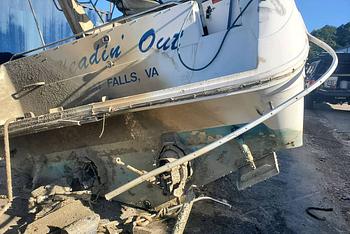If you’ve ever dreamed of owning a boat but thought the initial purchase price was way beyond what you could afford, then consider marine financing. Boat loans allow you to buy a boat now and spread the cost over several years in the same way you would for cars, motorhomes or any other type of major purchase. Over an agreed time period, you pay back the specified loan amount, with interest. The amount you pay back, how long the loan term is, and the interest rate will all vary depending on your needs and what the lenders are offering.
There are several points to consider before taking out a boat loan—starting with the types of loan available, then considering the overall cost of boat ownership and the monthly repayment amounts.
Let’s take a look at the ins and outs of marine financing so you can make an informed decision. Owning that longed-for boat might be easier than you thought.

Types of Boat Loans
While the nuts and bolts of financing a boat is always the same, there are four common types of boat loans that purchasers frequently use. Depending on your circumstances, any of these options may be appropriate.
Secured loans
To take out a secured loan you will need to put up some collateral as security, and in the case of buying a boat, the boat itself would be the collateral. What this means is, if you didn’t pay your monthly installments (known as defaulting on your loan), the lender could repossess the boat. The benefit of taking out a secured loan is that they usually come with lower interest rates and higher lending limits as there is less risk to the lender. The downside is that if you default on your loan, you risk losing your boat.
Unsecured loans
An unsecured loan doesn’t ask for any collateral, which means that there is no risk to you losing your boat if, for any reason, you can’t pay your monthly loan repayments. It would affect your credit score though. As there is more risk to the lender with an unsecured loan however, you are likely to be offered lower lending limits and higher interest rates. It does mean you are freer to use the loan money as you wish, which might include equipment for the boat, repairs or a trailer.
Home equity loans
Different from a personal loan, a home equity loan uses your house as collateral against the money you are asking to borrow. It is essentially a kind of second mortgage, and because it is secured, you will usually get better interest rates and higher lending limits. Of course, if you default on your loan, the risk is that the lender could repossess your house.
Fixed and variable rate loans
These types of loans vary based on the interest rates, and a fixed rate loan will have a set rate that you pay back for a set number of years, while a variable rate can change depending on the financial climate. While variable rate loans may appear lower and more appealing, fixed rate loans are less risky because the rate won’t suddenly change.
Common Boat Loan Terms
As we’ve seen, there are different terms to be agreed when taking out a loan or marine finance agreement, and these can vary considerably. The loan term and interest rate you are eligible for will also depend on your;
- Credit score
- Debt-to-income ratio
- The size of the loan
- Whether you choose a secured or unsecured loan
Boat loan repayment terms
How long you have to repay your loan can vary widely. The average loan term is around 10 years for boats, but it can be anything from around four to 20 years. The longer the repayment term, the less your monthly payments will be, but you’ll pay more in interest over the full course of the loan. The shorter the term, the higher the monthly payments will be, but ultimately you’ll save on interest. Longer boat loan terms are usually applicable on secured loans, while unsecured loans usually have shorter terms.
Down payments on boat loans
Another factor which plays a big role in how much you can borrow and what terms you’re offered is how much down payment or deposit you have. A down payment of around 10 to 20 percent is common for boat loans (although there are lenders who will, with the right credentials, offer loans with zero deposit). In general, the more deposit you can put down, the better the terms you’ll be offered and the lower the monthly repayments.
Another reason to consider putting down a good deposit is that you can offset the depreciation that may occur on your boat over the first few years. If you haven’t paid a deposit, the loan repayments might amount to less than the depreciation (this is especially the case with new boats) and you might end up owing more than the boat if you wanted to sell it.
Boat loan interest rates
Interest rates vary hugely on boat loans, and the rate you’re offered will depend on the current financial climate, as well as the type of boat you’re buying, your credit score and history, the loan term and the total loan amount. Interest rates on boat loans are usually fixed and can be around the 4 to 8 percent mark.
Where is the Best Place to Get a Boat Loan?
Once you know how boat loans work, the different types of loans and repayment terms available, the next step is to work out the best place to obtain a boat loan. These days, boat buyers have a few options, and the process of taking a loan is much simpler than it once was. Before choosing a loan, it’s important to compare several lenders, as you may find a much better deal by doing a bit more research. Here are the most common options:
- A dealer: Boat dealers often have access to some of the best boat-loan lenders in the industry and are highly experienced in helping their customers set them up. Available on both new and used boats, dealers have good relationships with the lenders and it can save you time searching for loans, as well as offering you the choice to have extras such as trailers added into the total loan amount. Having said that, dealership financing tends to be slightly more expensive, with higher interest rates and longer repayment terms.
- Traditional banks: Bricks-and-mortar banks offer loans for many reasons, including purchasing a boat. It’s always worth asking at your own bank first, as they may have good deals for existing customers. They also know your credit history and will be able to lend with this in mind. This is a good option for those who prefer to do things face to face and have a point of contact throughout the loan.
- Online lenders: Applying for loans online is now commonplace, and there are hundreds of lenders you can search for and compare before filling out a digital application. Online lenders offer competitive rates, and you can enter your loan terms into the search, receive a loan offer, and sign up for the loan quickly.

Pros and Cons of Financing a Boat
While this article focuses on financing a boat, there is of course the option to pay fully for your new purchase if you have the available funds to do so. But even those with available funds might choose to finance their boat. So what are the pros and cons of financing a boat?
Pros of financing
- You can buy the boat now. You won’t need to save up for years to buy your boat, and you can start enjoying the boating lifestyle immediately.
- It allows you to budget. Instead of using all your savings on buying a boat, taking out a loan and repaying it monthly allows you to budget better and have savings left for a rainy day.
- It can improve your credit score. If you’re diligent about repaying your loan on time each month, then a loan can actually improve your credit score.
Cons of financing
- The overall purchase price will be more. When you take out a loan there will be interest added to the repayments, so the total amount you pay over time will be more than if you had purchased it outright. Depending on the price of the boat, this could amount to thousands.
- There is a risk of losing your boat. If you default on a secured loan, the lender could repossess your boat.
- There is more paperwork to handle. Buying a boat with cash will certainly mean less paperwork and time spent searching for a lender.

Boat Financing FAQs
How long can I finance a boat for?
The average loan term for a boat is around 10 years, but anywhere from four to 20 years is common. As long as you take good care of your boat and protect its resale value, you can likely sell it at any time and pay off your loan.
Can I buy a boat from a private seller using finance?
Yes, using finance to buy a used boat from a private seller is very common and the process is straightforward. Once all the documentation is in place, a transfer of the loan amount to the private seller will be sent by your lender. A lender will likely ask for a marine survey to be completed on a used boat in advance to ensure that what is essentially their asset (or partly their asset) is a sound one. See our guide to Marine Surveys for more details.
How do I apply for a boat loan?
- Work out how much you want to borrow: You need to create a budget for your boat. Start by deciding what is the best type of boat for your needs (check out our guide to Choosing the Best Boat) and how much it will cost to buy. Then add on your best estimates for insurance, mooring fees, maintenance, safety equipment, fuel, and anything else you might need. Use our guide to The Real Costs of Boat Ownership for help.
- Check your credit score. Lenders will look at your credit score before offering you a loan, and the better the score the better the repayment terms will be. Check your score to see what your chances of getting a good loan will be.
- Choose your loan type. Decide if you want a secured or unsecured loan, and a loan with a fixed or variable interest rate. Weigh up the pros and cons to see what works best for you.
- Research lenders. There are many lenders to choose from so be sure to compare lots to get the best deal. Take into consideration reviews on their customer service, whether they have any additional fees or if they have useful tools such as online accounts.
- Choose a lender and apply. Once you’ve made your choice, it’s time to make your application. If you’ve chosen to go through a dealer they will help you every step of the way, as will a traditional bank. Applying online is also straightforward, with plenty of help and advice to make a successful application.
- Prepare necessary documents. You’ll be asked for various pieces of documentation in your application including pay stubs, proof of residence, identification, driver’s license, and other financial documents. There will also be the boat ownership documents at the end of the process too.
- Sail into the sunset: Buying a boat is more achievable using boat finance, and you can join the millions of boat owners all over the world as you set sail on your new purchase, knowing you can budget the cost of the boat over several years.




